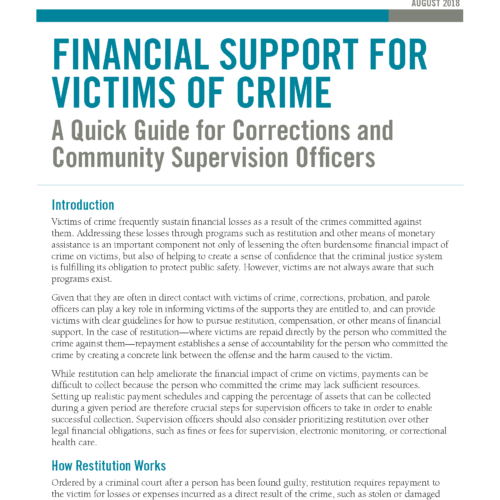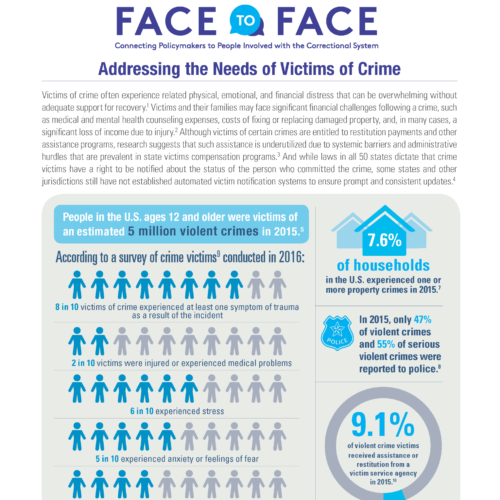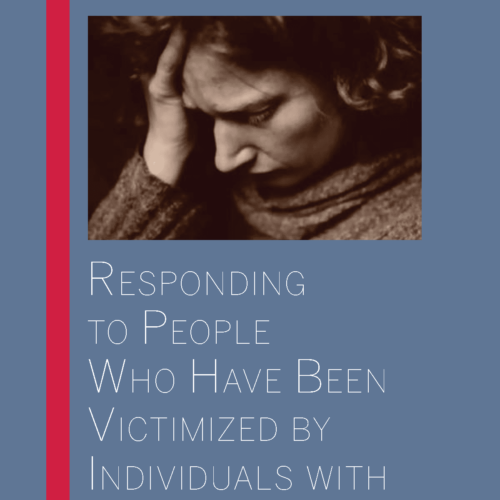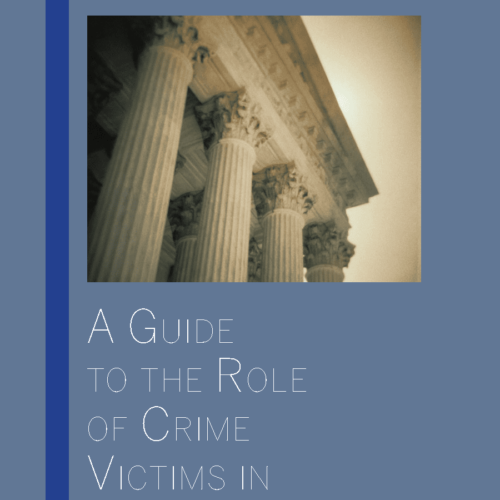Compensation Programs
Every state operates a crime victim compensation program to help victims pay for some of their expenses that result from a crime. Eligibility requirements vary, but at a minimum, a victim must report the crime, cooperate with the investigation and prosecution, and apply for compensation within a certain time period.
Unlike restitution, victim compensation can occur even if there is no arrest or prosecution. These programs vary by state, district, and territory, and are the payer of last resort – that is, they pay for certain expenses not covered by insurance or public benefit programs. Victims, their relatives, or their dependents must meet their state’s eligibility requirements to receive compensation. A victim cannot collect both compensation and restitution for the same losses. When a victim has already received compensation from the state for some losses, a court may order the person convicted of the crime to reimburse the state compensation program and may also order the person to pay the victim for losses that weren’t covered by compensation.
Expenses covered by compensation programs typically include medical care, mental health counseling, income loss due to crime-related injuries, loss of financial support for dependents of a deceased victim, as well as funeral and burial expenses. Most states do not pay for expenses due to crimes solely involving theft of or damage to property. A growing number of states are covering expenses related to relocation, crime scene cleanup, and immediate measures to ensure a victim’s safety and security. Funding for crime victim compensation programs typically comes from fines and fees collected from people convicted of crimes and people who receive traffic violations. Some states allocate general state funds to the compensation program as well. The federal government, through a formula grant program, matches 60 percent of a state’s allocation to this program.
Key benefits of compensation
- Does not require an arrest or prosecution
- Guaranteed to pay full amount awarded based on payment guidelines to eligible people
- Provides payments after eligibility is confirmed and award amount determined
Restitution
Courts order restitution as part of a person’s sentence when the victim can demonstrate that he or she sustained pecuniary losses (such as medical expenses, lost wages, or stolen or damaged property) as a result of the crime. Restitution can be vitally important to victims because they may lack the resources to make up for these losses on their own. In addition, collection of restitution can provide the victim with assurance that the person who committed the crime is being held accountable for his or her actions.
For a victim to receive restitution, he or she must document losses and expenses that occurred as a result of the crime and share that information with probation officers, prosecutors, and the courts. A probation officer will then include the victim’s losses in a pre-sentence investigation report that recommends a sentence to the judge. A prosecutor may subsequently ask for restitution as part of the sentence and may request a restitution hearing to determine if and how much restitution is owed. In addition to considering the losses suffered by the victim, a judge may take into account the offender’s current and future ability to pay when determining how much restitution to order.
The person ordered to pay restitution is expected to pay the full amount of restitution owed over the course of his or her sentence. Court-ordered restitution does not guarantee that the person ordered to pay it will do so, but it creates a means by which the state can pursue payment on behalf of the victim.
Key benefits of restitution
- Covers all offense types
- Holds people who committed offenses accountable
- Pays for losses not covered by compensation
Additional Resources
- “Making Restitution Real Toolkit,” The National Center for Victims of Crime, available at www.victimsofcrime.org/library/publications/restitution-and-compensation/restitution-toolkit.
- “Compensation for Crime Victims,” The National Association of Crime Victim Compensation Boards, available at http://www.nacvcb.org/NACVCB/files/ccLibraryFiles/Filename/000000000120/BrochureCVC1.pdf.
- CSG Justice Center, Victim Advocates Improve Justice Reinvestment in Nebraska, https://csgjusticecenter.org/jr/nebraska/posts/victim-advocates-improve-justice-reinvestment-in-nebraska/.
Disclaimer: This project was supported by Grant No. 2015-ZB-BX-K001 awarded by the Bureau of Justice Assistance. The Bureau of Justice Assistance is a component of the Department of Justice’s Office of Justice Programs, which also includes the Bureau of Justice Statistics, the National Institute of Justice, the Office of Juvenile Justice and Delinquency Prevention, the Office for Victims of Crime, and the SMART Office. Points of view or opinions in this document are those of the author and do not necessarily represent the official position or policies of the U.S. Department of Justice.
Arkansas policymakers have long expressed concerns about the state’s high recidivism rate. Over the past 10 years, an…
Read MoreIn April 2025, Arkansas Governor Sarah Huckabee Sanders signed a package of bipartisan criminal justice legislation into law,…
Read More Explainer: Key Findings and Options from Arkansas’s Justice Reinvestment Initiative
Explainer: Key Findings and Options from Arkansas’s Justice Reinvestment Initiative
Arkansas policymakers have long expressed concerns about the state’s high recidivism rate. Over the past 10 years, an estimated 72 percent of prison admissions in the state involved people who were revoked from supervision, with unmet substance use and mental health challenges playing a significant role in these failures.
Read More Explainer: How a New Law in Arkansas Tackles Crime, Recidivism, and Community Supervision Challenges
Explainer: How a New Law in Arkansas Tackles Crime, Recidivism, and Community Supervision Challenges
In April 2025, Arkansas Governor Sarah Huckabee Sanders signed a package of bipartisan criminal justice legislation into law, which is designed to increase public safety and improve community supervision. The legislation passed nearly unanimously.
Read More














